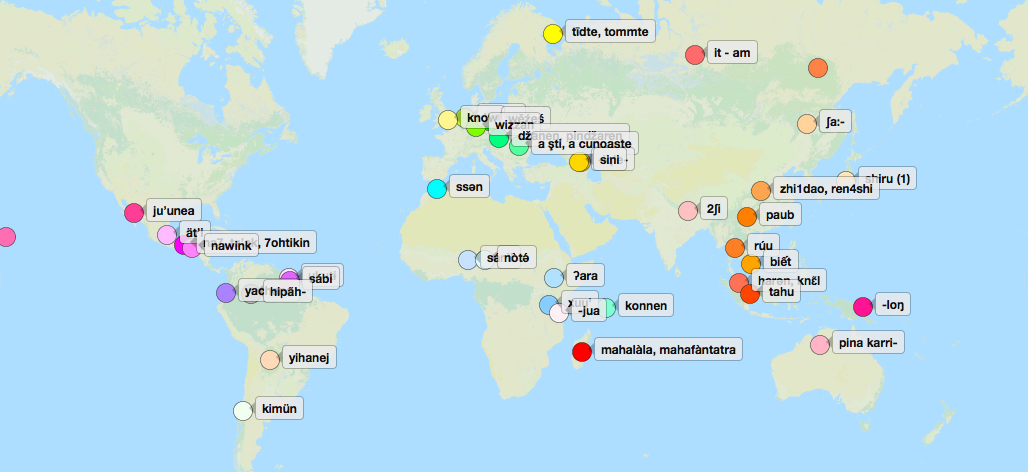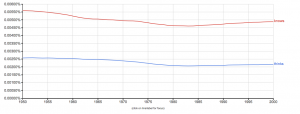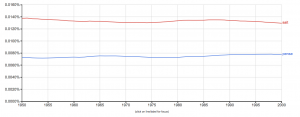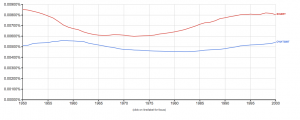I’m surprised to find myself here. I started out in philosophy as a very old-fashioned epistemologist, concerned with the question of how necessary truths are known, and I think there was a whole chapter in my thesis arguing against naturalist approaches. For what it’s worth, I’m still a sworn enemy of naturalist epistemology, when that is understood as the project of taking all questions about knowledge to be answerable through empirical methods (not least because there are deep and open epistemological questions about “empirical methods” that aren’t answerable this way). But I’ve come around to thinking that some research in epistemology can benefit immensely from engagement with the empirical, and especially with work on mental state attribution, the contrast between intuitive and reflective thought, and many other topics well covered here at Brains Blog. I lurk on this blog all the time. So first, thanks to John and Kristina for the work you’ve done here, and for the warm welcome.
Epistemology has changed very rapidly in the last half-century. Although Edmund Gettier wasn’t the first to discover cases of this kind (I think the Indo-Tibetan tradition beat him to it by about 1200 years) , his cases of apparently justified true belief without knowledge posed a stimulating challenge to then-dominant and rather dull theories about the relationship between knowledge and belief. Not only did his particular cases cut against the simple justified-true-belief approach, his method of crafting counterexamples seemed to work against an alarming range of other theories of knowledge. Even for baroque theories with many complex conditions to mop up problem cases, with practice, it wasn’t hard to devise a case that would be problematic. Those of us who have read the right recipe book start feeling like five minutes with a ballpoint pen and a cocktail napkin should be enough to generate an intuitive counterexample to any attempt at an analysis of knowledge (assuming it’s not already doomed as a circular analysis, illicitly helping itself to some epistemically-drenched notion). Come at me, bro.
What fascinates me in the Gettier literature is this: it’s amazing that we actually have instinctive responses to these artificial cases, at all. I’m not surprised that verdicts aren’t unanimous on Gettier cases; the stories are complex and typically open to various interpretations, and the task of knowledge attribution is subtle. What intrigues me, even in my own case, is that I’ll feel a sharp verdict at all, when facing some ridiculously novel scenario. Where is that feeling coming from?
It’s a hard question in part because we have such limited introspective insight into whatever is producing these feelings in us, as witnessed by the difficulties we’ve had coming up with an explicit theory we might be following in the way we draw the line between knowledge and belief.
One of the founding papers of experimental philosophy gave the question a pretty gloomy answer, suggesting that philosophers’ instinctive responses to Gettier cases were products of their contingent cultural training, and declaring that “most of the world’s population apparently does not share these intuitions” (Weinberg, Nichols and Stich 2001, 452). WNS’s 2001 suggestion that Gettier cases are not registered as such by cultural South Asians, in particular, struck me as wrong — I wondered about Narayan Champawat and John Turk Saunders’ clever 1964 paper against Michael Clark’s doomed effort to solve the Gettier problem, and I wondered about my own South Asian students, who seemed to respond to the Gettier problem the same way everyone else did. Working with Raymond Mar and Valerie San Juan, I did some work on this problem, and we found that our multicultural student population (similar in relevant ways to the population at Rutgers sampled by WNS) responded to Gettier cases (and other cases of epistemological interest) in the standard way, regardless of ethnicity or gender. Deeper and broader work has been done on this problem since, first by John Turri and Hamid Seyedsayamdost, and very strikingly by an international team led by Edouard Machery and including Stephen Stich himself, now finding that Gettier responses are universal. Thank goodness, back to the Gettier fun factory.
Looking at Gettier cases, especially with the recognition that others also tend to see them as cases where knowledge is absent, can give you the feeling that positive knowledge attribution should be rare: to know, it isn’t enough that you are right about something, or even that you are both right and in possession of what seems to you like great evidence — you have to meet an even stronger standard, where the nature of this standard is something that is very hard to articulate.
Nevertheless, we attribute knowledge all the time. Verbs meaning “know” get heavily and steadily used across languages. Take a look at graphs comparing use of the verbs “know” and “think” (and their translations) across a half-century, across a few languages. Here’s English (the verb meaning “knows” is always in red):
and Russian:
That red (“knows”) line is on top for many languages — and even in languages (like Mandarin Chinese) where a synonym of “think” is more popular, a verb meaning “know” remains very common — I have yet to find a language where “know” is out of the top 30 verbs. But why exactly are we speaking so much of knowing?
The steadiness of use over time makes verbs meaning “know” and “think” pop out like function words (for fun, compare use of “and” and “or” in all the languages you can think of). But if the function of mental state attribution is to anticipate behavior, why can’t we do more work with the less demanding notion of belief? We could add in the idea of getting it right, when we needed to — English and many other languages have perfectly good and economical ways of doing that (“Smith is right that P”).
My next post will look at some interesting differences between attributions of being right and knowing, looking at literature in linguistics and developmental psychology. With luck, we might even find some clues there about why Gettier cases don’t register as cases of knowledge.





The fact that thought experiments are ubiquitous in epistemology might be relevant too.
E.g. Let’s pretend there is a red barn in a field. In the other fields there are real-looking, but fake barns. A person driving a passing car remarks, “Hey look, a barn.” However, they have said this about the fake barn. What exactly do they know, or not know?
Now, the first relevant thing to consider is that this account , to be so uttered, puts into play the *certainty* that the fake barn is a fake barn, and the real barns real. However, this condition of certainty is a metaphysical enthymeme; and it is only in thought experiments that *certainty* has this stable, identifiable sense.
In turn, the identity ‘knowledge’ is felt to have a coherent sense so far as eluding any attempt to match the certainty of its grounding articulation.
In contrast, scientific proof obviously never achieves an equivalent point of certainty. Tests and identities only increase in resolution, or shift in definition. *Knowledge* as such here is at its highest degree of rigour, and yet will be intuited as lacking something, if measured in reference to a thought-experiment. This is only due to the fact that epistemological thought-experiments misleadingly introduce a pretence of *certainty*, since here language dictates simple-seeming states of affairs absolutely. In life, it is never simply the case that a ‘fake’ barn can be a given certainty.
Instead of making this explicit, epistemology more often falls into the trap of articulating *yet more* thought-experiments. The more elaborate, the less relevant.
Perhaps.
Hi Brian!
It’s true that when I lay out a thought experiment, I’m taking the God’s eye perspective and telling you that this is a barn, and that the other thing is a fake barn — you’re given that, as a reader. So I think you are right that thought experiments “put into play” the idea of certainty, in some sense.
But I think the phenomena that we explore in epistemology, when we start by looking at intuitive impressions of knowledge, don’t have to be elicited just by thought experiments. You can generate a Gettier case in real life (like this one Andy Cullison experienced once: https://www.andrewcullison.com/2009/06/gettier-in-real-life/). And if it happens to you, you’ll have the same realization, after the fact: I had a true belief, I was justified, but I didn’t know. And those impressions are interesting, however we ultimately decode their significance for epistemology.
I’m not so sure about your suggestion that equivalent certainties are never achieved in science — that looks wrong to me. I’ll agree that scientists more than laypeople will draw explicitly guarded conclusions, often statistically guarded conclusions, but I think their conclusions aren’t always of that character, and even when they are, it is typically the case that the guarded conclusion is drawn from a background of many facts taken and treated as certain, indeed as known. At least the language of science papers is often heavy with knowledge attributions, factive verbs like “notice” and “realize”, and many observations whose status as knowledge is not in question, as the background to the paper’s main claims, which may or may not be drawn with certainty. If scientists make unqualified assertions, and especially if they themselves describe their teams and peers as knowing things, I think there’s a heavy burden on you as the challenger to show that they are only ever increasing the resolution of a finding. It might be harder to demonstrate many things empirically than to imagine them having been demonstrated in a thought experiment, but I don’t think there’s anything wrong with doing thought experiments, even elaborate ones, to probe some interesting facets of our intuitive capacities to attribute knowledge.
That said, I’m sympathetic to the idea that epistemology can also reach beyond thought experiments: we can look critically at various patterns of intuitive knowledge attribution, for example, and wonder if some of these patterns hold keys to traditional paradoxes about the abstract nature of knowledge and belief. We can also look at the development of the mental state lexicon, which I think holds some clues to the logical structure of the concept of knowledge.
Hello indeed 🙂
Agreed: factive verbs have been really, really well earned in science and mathematics. I’d even say that it is precisely in these disciplines (under statistical, democratic, falsifying methodology) that we arrive at the most rigorous degree of knowing.
What I notice in epistemology, then, is that a new kind of question is asked of knowing as such that no longer pertains to this methodology, nor ordinary language use.
And this is because uniquely under fictive articulation (or thought experiments), the sense of *certainty* is introduced. But it is introduced implicitly relative to the point in question, with the consequence of forever changing the meaning of ‘to know’. E.g. for Descartes, to know something becomes to know it without the possibility for doubt; in other words, to be acquainted with the truth absolutely (whatever that is supposed to be like?). To look the Platonic Sun in its face, post-cave.
This is permitted uniquely of fiction because, there, *words put into place a world*. Diegesis precedes figural perception. This is the reverse of our own perspective in this world. Here, of course, the world appears to me before my words can be uttered about it. This is very simple, but very, very subtle. Its consequences, though, are huge.
Disjunctivism is given the time of day if we do not take heed of it! Ha!
Knowledge comes to mean ‘having been acquainted in certitude with truth’, which ordinary use never insisted, nor ever could insist (without the use of a fiction or thought experiment). Metaphysical certainty is the child of words uniquely; more precisely, words that dictate a world into the world.
And, without heeding this word-world economy unique to fiction, we might be led to think that looking at a broken clock that happens to tell ‘the true time’ does not equate to ‘knowing’ the time. In fact, our reading of the time is always a matter of relative checks, and not a referential procedure in trace of The True Time. But we forget this in exchange for a Certain Identity for time, when we hear any thought experiment. Its a subtle matter of referential identity, whose certitude only usually pertains to our consciousness of our consciousness. Fiction allows us to pretend that we have this certainty for worldly identitues too. But that is *never* the case.
So yes, I think scientists do know things, but never in the epistemological sense. The epistemological sense, so far as I see, has its value in characterising the unique and wonderful condition of consciousness-in-language. But no value in empirical language use. It doesn’t belong there. It’s a completely different word, but has the same signifier.
Thanks again for your reply, Jennifer. This is interesting.